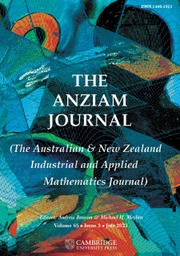Article contents
On interpreting the sums of asymptotic series of positive terms
Published online by Cambridge University Press: 17 February 2009
Abstract
Four different kinds of positive asymptotic series are identified by the limiting ratio of successive terms. When the limiting ratio is 1 the series is unsummable. When the ratio tends rapidly to a constant, whether greater or less than 1, the series is easily summed. When the ratio tends slowly to a constant not equal to 1 the series is compared with a binomial model which is then used to speed the convergence. When the ratio increases linearly, a limiting binomial and an exponential integral model are both used to speed convergence. The two resulting model sums are consistent and in this case are complex numbers. Truncation at the smallest term is found to be unreliable in the second case, invalid in the third case, and the exponential integral is used to produce a significantly improved truncation in the third case. A divergent series from quantum mechanics is also examined.
Information
- Type
- Research Article
- Information
- Copyright
- Copyright © Australian Mathematical Society 1982
References
- 1
- Cited by

